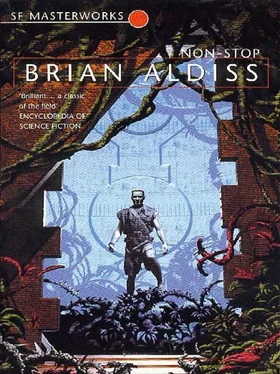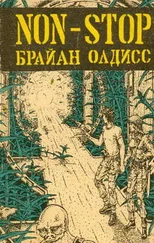The revels were now over. The actors, not bothering to return to their apartments, lay where irresistible sleep had found them, among the bright ruins of their gaiety. On the hard deck they lay sleeping stupidly, or woke without troubling to move. Only children called as usual, prodding somnolent mothers into action. Quarters looked like a broad battlefield; but the slain had not bled, and suffering was not yet finished for them.
Complain walked quietly among the sleepers. In the Mess, patronized by single men, he might be able to get food. He stepped by a pair of lovers sprawled over the Travel-Up pitch. The man, Complain saw, was Cheap; he still had his arm round a plump girl, tucked inside her tunic; his face was in Orbit; their feet straggled across the Milky Way. Little flies crept up her leg and under her skirt.
A figure was approaching. Not without misgiving, Complain recognized his mother. The law in Quarters, not rigorously enforced, was that a child should cease to communicate with his brothers and sisters when he was hip high, and with his mother when he was waist high. But Myra was a garrulous woman; what her waist proscribed, her tongue discarded, and she talked firmly to her many children whenever possible.
‘Greetings, Mother,’ Complain grunted. ‘Expansion to your ego.’
‘At your expense, Roy.’
‘May your womb likewise expand.’
‘I’m getting too old for that courtesy, as you well know,’ she said, irritated that he should choose to be so formal with her.
‘I’m off to get a meal, Mother.’
‘Gwenny is dead then. I knew it! Bealie was there at your stroking and heard the announcement. It’ll finish her poor old father off, you see. I was sorry I couldn’t get there for it — for the stroking I mean — I shan’t miss the others if I can possibly help it — but I got the most glorious shade of green in the scrambles. I dyed everything. I dyed this smock I’ve got on now; do you like it? It really is the most exciting thing –’
‘Look, Mother, my back hurts: I don’t feel like talking.’
‘Of course it hurts, Roy; you mustn’t expect it not to. What it’ll be like when you’ve finished your punishment, I shudder to think. I’ve got some fat I’ll rub on it for you, and that’ll ease the pores. Doctor Lindsey ought to look at it later, if you’ve got a spare bit of game to exchange for his advice — and you ought to have now, with Gwenny gone. Never did really like her –’
‘Look, Mother –’
‘Oh, I’ll come with you if you’re going to Mess. I wasn’t really going anywhere special. I did hear, quite on the quiet of course — from old Toomer Munday, although hem knows where she got it from — that the Guards found some tea and coffee in the dye store. You notice they didn’t scrabble that around! The Giants grew better coffee than we can manage.’
The flow of words wove round him, as abstractedly he ate. Later, she took him to her room and smoothed fat across the welts on his back. As she did so, she offered him advice he had heard from her before.
‘Remember, Roy, things won’t always be bad; you’ve just struck a bad patch. Don’t let it get you down.’
‘Things are always bad, Mother, what’s there to live for?’
‘You shouldn’t talk like that. I know the Teaching says about not hiding any bitterness within you, but you don’t look at things the way I do. As I always say, life is a mystery. The mere fact of being alive –’
‘Oh, I know all that. Life’s a drug on the market, as far as I’m concerned.’
Myra looked hard at his angry face, and the lines on hers rearranged themselves into an expression of softness.
‘When I want to comfort myself,’ she said, ‘I think of a great stretch of blackness, sweeping off for ever in all directions. And in this blackness, a host of little lanterns begin to burn. Those lanterns are our lives, burning bravely. They show us our surroundings. But what the surroundings mean, who lit the lamps, why they were lit…’ She sighed. ‘When we make the Long Journey, when our lamp goes out, perhaps we shall know more.’
‘And you say that comforts you?’ Roy asked scornfully. It was a long while since he had heard the lantern parable from his mother, and soothing to hear it again now, but he could not allow her to see this.
‘Yes. Yes, it comforts me. You see, our lanterns are burning together here .’ She touched a spot on the table between them with a small finger. ‘I’m thankful mine isn’t burning alone here , out in the unknown.’ She indicated a spot an arm’s length away.
Shaking his head, Complain stood up.
‘I don’t see it,’ he confessed. ‘It might very well be better out over there.’
‘Oh, yes, it might. But it would be different. That’s what I’m afraid of. It would all be different: everything would be different.’
‘I expect you’re probably right. I just wish it was different here. By the way, Mother, my brother Gregg who left the tribe and went alone into the tangles –’
‘You still think of him?’ the old lady asked eagerly. ‘Gregg was a good one, Roy; he’d have made a Guard if he had stayed.’
‘Do you think he might still be alive?’
She shook her head decisively. ‘In the tangles? You may be certain the Outsiders got him. Pity, a great pity — Gregg would have made a good Guard. I’ve always said so.’
Complain was about to go when she said sharply, ‘Old Ozbert Bergass still breathes. They tell me he calls for his daughter Gwenny. It is your duty to go to him.’
She spoke, for once, undeniable truth. And for once duty was coloured with pleasure: Bergass was a tribal hero.
One-armed Olwell, carrying a brace of dead duck over the crook of his good arm, gave Complain a surly greeting; otherwise, he did not meet a moving soul. The rooms in which Bergass had his household were now far in the rear of Quarters. Once, these rooms had been at the leading barricade. As the tribe inched its way forward, they had gradually slipped back; when they had been in the midst of the tribe, Ozbert Bergass had been at the height of his power. Now, in his old age, his rooms lay far to the rear of anyone else’s. The last barrier, the barricade between humanity and Deadways, stood just beyond his doors. Indeed, several empty rooms separated him from his nearest neighbours: his former neighbours, weaklings, had evacuated some while since, moving back to the centre of things; he, stubborn old man, stayed where he was, stretching lines of communication and living in glorious squalor with an inordinate number of women.
Down here had been no revelry. In contrast with the temporary cheerfulness of the rest of Quarters, Bergass’s passage looked sinister and chill. Long ago, probably in the time of the Giants, some sort of an explosion had taken place. The walls were blackened for some distance, and in the deck overhead a hole bigger than a man’s length gaped. Here, outside the old guide’s doors, no lights burned.
The continued advance of the tribe had added to this neglect, for a few ponics, seeding themselves determinedly across the rear barrier, grew in shaggy, stunted procession along the dirty deck, thigh high only.
Uncomfortably, Complain banged on Bergass’s door. It opened, and a babel of sound and steam emerged, wreathing like a cloud of insects round Complain’s face.
‘Your ego, mother,’ Complain said politely to the old witch who peered out at him.
‘Your expense, warrior. Oh, it’s you, Roy Complain, is it? What do you want? I thought every fool young man was drunk. You’d better come in. Don’t make a noise.’
It was a large room, absolutely cluttered with dried ponic poles. They lined all the walls, making of the room a dead forest. Bergass had had an obsession that the very fabric of their world, walls and deck, might be demolished, and the tribe live in the ponic tangles in rooms built of these poles. He had tried this experiment himself in a broad part of Deadways and survived; but nobody else had taken up his idea.
Читать дальше










